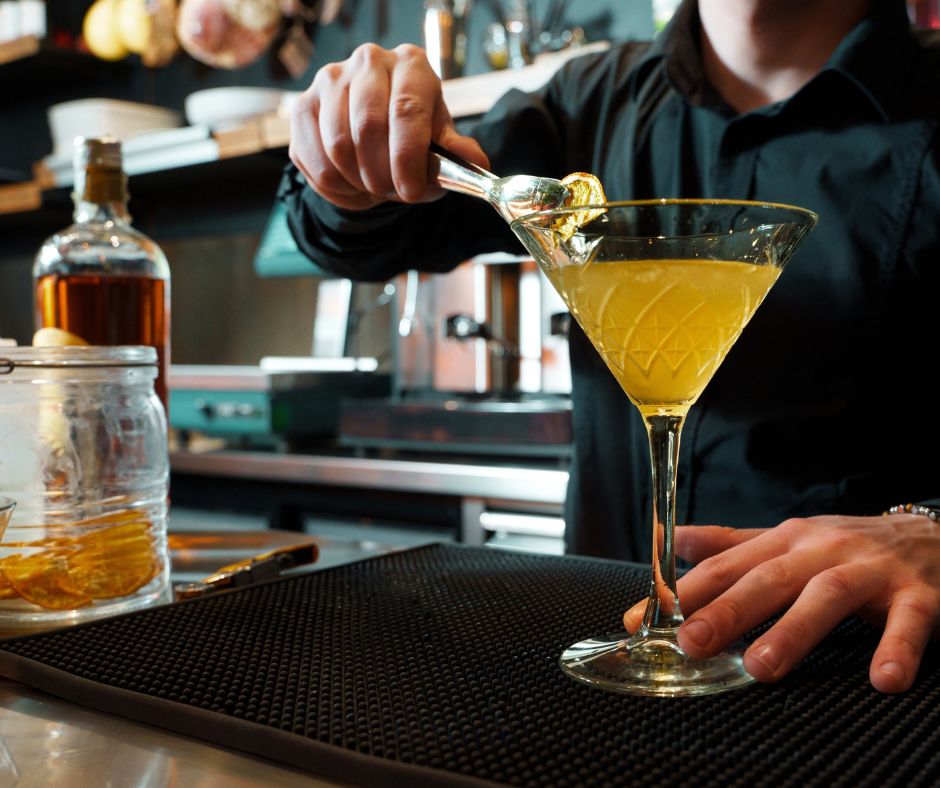Step up to a busy neighborhood bar, and the person behind it moves fast—pouring drafts, shaking classics, and remembering regulars.
Walk into a craft cocktail lounge, and you may meet someone measuring house infusions and discussing flavor balance.
Those contrasts raise a common question: mixologist vs bartender—what is the real difference? Understanding how each term is used (and how the roles often overlap) can help you choose a possible career path.
If you are exploring bar work, choosing training programs, or simply curious about the terminology, this guide explains the difference between a bartender and a mixologist and their duties.
What Is the Difference Between a Bartender and a Mixologist?
A bartender’s primary job is to serve guests efficiently and responsibly. They take orders, make drinks to specifications, handle payments, maintain bar flow, and support the guest experience.
A mixologist concentrates on the craft of drink creation by developing recipes, balancing flavors, working with specialty ingredients, and sometimes designing cocktail menus.
In practice, many bar professionals do both: they serve guests and contribute to drink development.
Bartender vs Mixologist: Core Responsibilities Compared
Before choosing training or applying for jobs, it helps to see how the day-to-day work of a bartender vs a mixologist differs. The sections below break down typical responsibilities so you can quickly see the difference between a bartender and a mixologist.
Bartender
A bartender works at the front line of guest service. Typical responsibilities include the following:
- Greeting guests,
- Taking drink and food orders,
- Preparing standard cocktails,
- Pouring beer and wine,
- Monitoring guest consumption for responsible service,
- Handling cash or point-of-sale systems, and
- Keeping the bar stocked and clean.
Speed, accuracy, and hospitality are critical. Bartenders also coordinate with servers and kitchen staff, manage glassware, and monitor ID verification and local alcohol laws.
Mixologist
A mixologist generally focuses on the craft side of beverages by doing the following:
- Research spirits,
- Experiment with infusions,
- Create house syrups or cordials,
- Balance acidity and sweetness, and
- Design seasonal or themed cocktail menus.
In many programs, a mixologist also trains other staff to execute recipes consistently. Presentation matters: proper glassware, ice shape, garnish, and aroma are all part of the guest experience. Some mixologists also consult for bars, restaurants, or events, building signature drink programs.
Work Settings and Career Paths
Bartender and mixologist roles exist in many environments, including neighborhood pubs, hotel lounges, fine-dining restaurants, music venues, cruise ships, tasting rooms, and event catering companies. Craft cocktail bars may emphasize house creations and technique, while casino or stadium bars emphasize volume and speed. Mobile bar businesses, private event services, and pop-up cocktail experiences offer additional paths for entrepreneurial workers.
Earning potential varies with venue type, drink pricing, shift volume, and tipping culture. Workers who combine guest-service strengths with recipe development skills may move into lead bartender, beverage manager, or bar program director roles.
Training: Do You Need Different Education?
Most entry-level bartending jobs provide on-the-job training: learn house specs, local laws, and basic pours. Some states require an alcohol server or responsible beverage certification to work with alcohol.
Mixology training is usually less regulated and more creative; people learn through classes, industry workshops, recipe books, and mentorship from experienced bar leads.
Which Path Fits You?
If you are deciding between the bartender vs mixologist path, ask yourself:
- Do you enjoy fast-paced guest interaction and multitasking under pressure?
- Are you drawn to flavors, ingredients, and recipe experimentation?
- How comfortable are you with memorization?
- Do you prefer steady service shifts, creative development work, or a mix?
Your answers can guide where to start. Many people begin in a traditional bartending role to build speed and service skills, then move toward mixology as they gain confidence and develop interests.
Either way, you must prove reliability by showing up prepared, keeping stations clean, and supporting teammates.
Explore Bartender Basics with Stratford Career Institute
Ready to put what you’ve learned about the mixologist vs bartender difference into motion?
If you want a low-pressure way to explore the hospitality foundations that support both roles—service flow, guest interaction, and workplace basics—consider Stratford Career Institute’s at-home bartender course as an early step.
Our course can help you get oriented before you invest in hands-on bar or mixology training. Study on your schedule and learn the basics.
Contact Stratford Career Institute to learn more about our course and enroll online.


